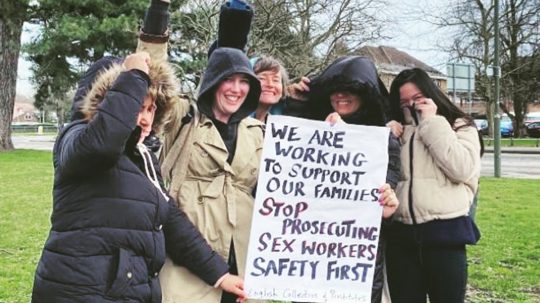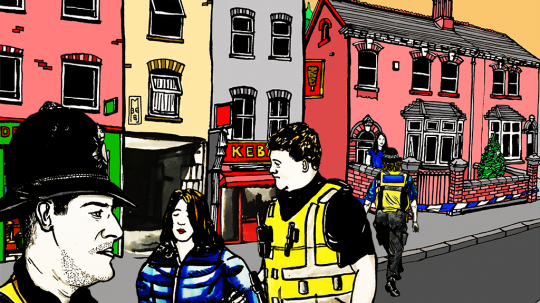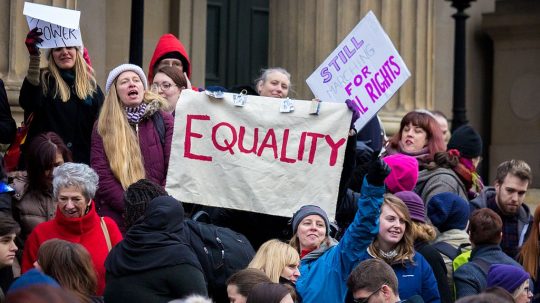A member of United Sex Workers (USW), the union for sex workers, has been granted anonymity in her case against SumUp, a major card-payment machines provider. This is a significant win in a landmark case challenging financial discrimination against sex workers.
The claimant, “CC”, is a sex worker whose work is legal. She uses a pseudonym, keeping her legal name and identity private. Only a select group of trusted individuals know of her occupation.
In September 2020, CC opened an account with SumUp so she could accept card payments from clients without disclosing her legal name, which is attached to her bank account. This would help her avoid the risks that come with cash payments, such as being underpaid, whilst reducing the risk of being harassed, harmed or “outed” by clients who discovered her true identity. However, the next month, SumUp closed CC’s account because she is a sex worker. It pointed to its “restricted business” list, which includes “escort services.”
CC alleges that SumUp’s policy of withholding services from sex workers is indirect gender discrimination contrary to the Equality Act 2010 (EA). Unfortunately, most banks and financial services providers have policies that discriminate against sex workers. There is no straightforward way for sex workers to legally challenge these policies. The EA prohibits discrimination connected to certain ‘protected characteristics’, but being a sex worker is not a protected characteristic. Because most (although not all) sex workers in the UK identify as women, the strongest argument is that policies that discriminate against sex workers indirectly discriminate against women.
In most claims, sex workers will wish for anonymity so they are not ‘outed’ as sex workers. Being outed carries serious risks, ranging from being harmed by clients, through being barred from alternative employment to eviction and losing custody of children. In CC’s case, anonymity was paramount. One of the central reasons she obtained SumUp’s services was to keep her identity private, but the legal starting point is that the names of the parties in a case, the details of the claim and judgements are made public.
Anonymity is allowed in limited circumstances where it is “strictly necessary” to the “administration of justice” and/or to protect the right to private and family life, guaranteed by Article 8 of the Human Rights Act. These considerations are balanced against the need to promote ‘open justice’ and freedom of expression. In a sex work context, receiving anonymity is far from guaranteed and had never been granted in an EA claim. For instance, in a widely-criticised judgement, a Tribunal recently refused anonymity to a stripper seeking to sue a club for allegedly violating her labour rights.
The claim was issued in April 2021 and five months later the court awarded CC anonymity. It acknowledged that refusing anonymity would threaten CC’s Article 8 rights, exposing her to a risk of harm. It also highlighted that justice would be undermined, as the whole reason CC brought the claim was to use services aimed at keeping her identity private.
Now CC has anonymity, the court will decide whether SumUp’s policy violates the EA – unless the matter is resolved outside of court. SumUp claims its policy is legally justified by a “real business need”.
The Wider Picture

Credit: Andrea Piacquadio / Pexels
Financial discrimination against sex workers has reached mainstream news over the past year, partially due to OnlyFans’ temporary announcement that it would prohibit sex workers from using the platform due to pressure from banks. USW members report issues with banks and platforms, including PayPal, Square, Monzo, Santander, Revolut, HSBC and NatWest.
For example, Charlotte Edwards, a USW member, is currently engaged in an EA challenge against Santander who initially refused to provide her a loan because she is a sex worker. In the United States, sex workers report accounts being closed suddenly by Venmo, Bank of America, American Express, JP Morgan and even GoFundMe. Card issuers Visa and Mastercard place serious pressure on banks to refuse services to sex workers.
We hope financial service providers demonstrate their commitment to equality and progressive values by dropping such discriminatory policies
Such discrimination excludes an already marginalised group of workers from accessing the financial system. It can result in serious financial loss. For example, accounts are often closed containing money that is never recovered. It can prevent sex workers from obtaining loans, mortgages, paying tax, registering their business legally, requesting deposits from clients and accessing state benefits. It is a serious attack on the dignity of sex workers, causes severe stress and makes financial stability extremely difficult.
Obtaining anonymity for CC was a significant win in a novel case. However, USW still strongly encourages SumUp and any banks with similar policies to work with USW to stop discriminating against sex workers prior to any court decision. We hope financial service providers demonstrate their commitment to equality and progressive values by dropping such discriminatory policies without the need for lengthy legal battles.
USW encourages both new and existing members to contact them by email if they need help with financial discrimination at: usw.legal@uvwunion.org.uk








